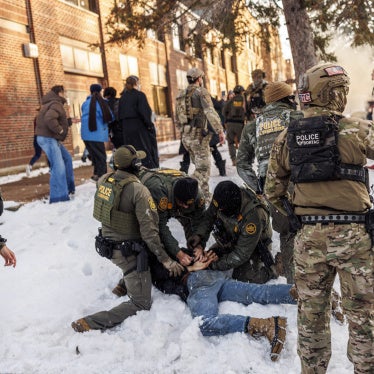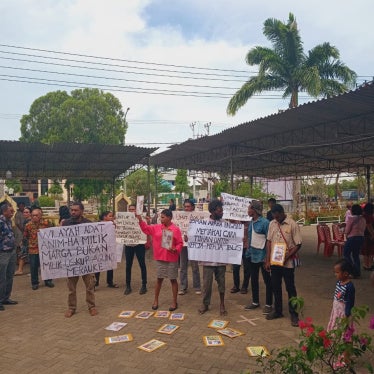ARBIL, Iraq -- During a dinner in Iraqi Kurdistan last month, the elderly matron of the family I was dining with urged my interpreter to translate her question. The interpreter was reluctant, but finally did. Was it true what people were saying? That the U.S. would release a gas in Baghdad to put the populace to sleep, then snatch President Saddam Hussein and his henchmen without the need for bombs?
"If only it could be so easy," I replied, laughing. Her face fell. She had clearly been clinging to the hope that a bloodless coup was possible, one in which her many relatives in Baghdad would escape unscathed.
It's not just Iraqis who don't want to face the very real likelihood of widespread civilian casualties resulting from U.S. military action. Debate in America has focused on polarizing questions about the propriety of preemption, the wisdom of forcing regime change and the strength of the evidence concerning Iraq's weapons of mass destruction. But whether one favors or opposes war (my organization, Human Rights Watch, is neutral on that issue), it is equally important to consider the grave dangers the Iraqi people could face once war starts, and to develop workable strategies to minimize those dangers.
The risk of civilian casualties from the fighting itself is likely to be particularly high in Iraq. Hussein will almost certainly attempt to draw the U.S. into an urban battle, one in which Iraqi civilians are used as human shields. Anyone who remembers the intense fighting in Jenin several months ago, or the bloody 1993 battle of Mogadishu, Somalia, depicted in the movie "Black Hawk Down," realizes what dangers urban warfare represents. In addition, despite significant technological improvements during the last decade, the Pentagon continues to make deadly mistakes from the air, often by relying on inaccurate intelligence. Finally, U.S. willingness to target and destroy civilian infrastructure such as water treatment facilities is likely to cause many casualties; during the first Gulf War, more civilians died as a result of this practice than were killed directly by the bombs.
In Iraq, civilian casualties caused by U.S. military actions would probably be only a part of the picture. The greatest threat to the Iraqi people could well come from the Iraqi army. The direct civilian death toll of allied military action during the Gulf War, Kosovo and Afghanistan combined is dwarfed by the estimated 30,000 who died during Hussein's repression of the 1991 uprisings, or by the estimated 100,000 Kurds killed in his genocidal Al Anfal campaign in the late 1980s. Hussein is the only known head of state who has used chemical weapons against his own people -- as he also did against Iranian troops -- and he is likely to do so again in any battle for his life.
In Kurdistan last month, the risks to civilians were very clear. My driver took me out to the last house in the dusty Iraqi Kurdish village of Kalak, the last outpost before the border with the rest of Iraq. From the roof of the house, I looked out at Iraqi army troops that have taken up positions on a line of hills a few hundred meters away. Iraq's Kurds, armed with little more than machine guns, stand no chance against the well-equipped Iraqi troops on the hills. The troops are restrained from attacking by the threat of U.S. retaliation. This curb would be removed if the U.S. decided to attack Iraq. It is people like the virtually defenseless villagers of Kalak who would face the wrath of a cornered Hussein.
If the United States initiates a war with Iraq, it will have an obligation to do what it can to protect vulnerable Shiite and Kurdish populations from attack. In Kosovo, NATO bombers could do little from the air to protect civilians as the Serbian forces intensified their killing in response to the bombing. The United States cannot allow a repeat of that tragic experience.
The safety of Iraqi civilians will be greatly complicated by the fact that there is only a limited humanitarian presence in the country, and that the agencies present are subject to the whims of Baghdad. In Iraqi Kurdistan, I saw almost no preparation for a humanitarian crisis or chemical weapon attacks --partly because Baghdad controls the flow of humanitarian aid to the north.
Fleeing civilians may also face closed borders, blocking access to safety. In 1991, tens of thousands of people trying to escape were stuck on the wrong side of the closed Turkish border; some froze to death. Any planning for military action requires the development of a well-funded humanitarian option, and pressure on regional governments to commit to keeping their borders open.
War in Iraq could also cause furious interethnic fighting and massive retribution against perceived supporters of Hussein. During my three weeks in Iraqi Kurdistan, I met with dozens of Kurdish and Turkoman families recently expelled by the Iraqi government from the oil-rich city of Kirkuk and now living in miserable conditions in Kurdistan. The Kurds can be expected to return en masse to Kirkuk at the first opportunity -- and they could well decide to retaliate against the Arabs whom Hussein brought in to replace them. There is also likely to be a fierce, and perhaps violent, competition among Arabs, Kurds and possibly Turkish troops over control of the city.
It is likely that members of Hussein's Baath Party, his Tikrit clan and his hated security services will face severe retaliation in the immediate aftermath of his fall. To prevent blood baths, the U.S. needs to make absolutely clear to its potential allies among Hussein's opposition that abuses by them will be punished. Such a commitment was not forthcoming in Afghanistan, where the Northern Alliance troops in Mazar-i-Sharif killed hundreds of captured combatants without much worry about being brought to justice.
Finally, experience teaches us that the fall of a government creates a security gap. In Afghanistan, U.S. failure to immediately fill that gap allowed the warlords to force their way into positions of control and allowed mass looting and similar abuses. In Kosovo, the victorious Kosovo Liberation Army immediately began killing Serbian and Gypsy civilians whom they suspected of collaboration with Yugoslav President Slobodan Milosevic. Bringing stability, security and accountable governance to Iraq is a major, long-term commitment, but one that the United States must shoulder when it embarks on such an intervention.
The Bush administration appears to be planning for a more ambitious role in Iraq than in Afghanistan -- including the possibility of a long-term military occupation of the country. In that planning, the security of the civilian population, particularly in the chaotic early days after Hussein's fall, must be a paramount U.S. objective.








